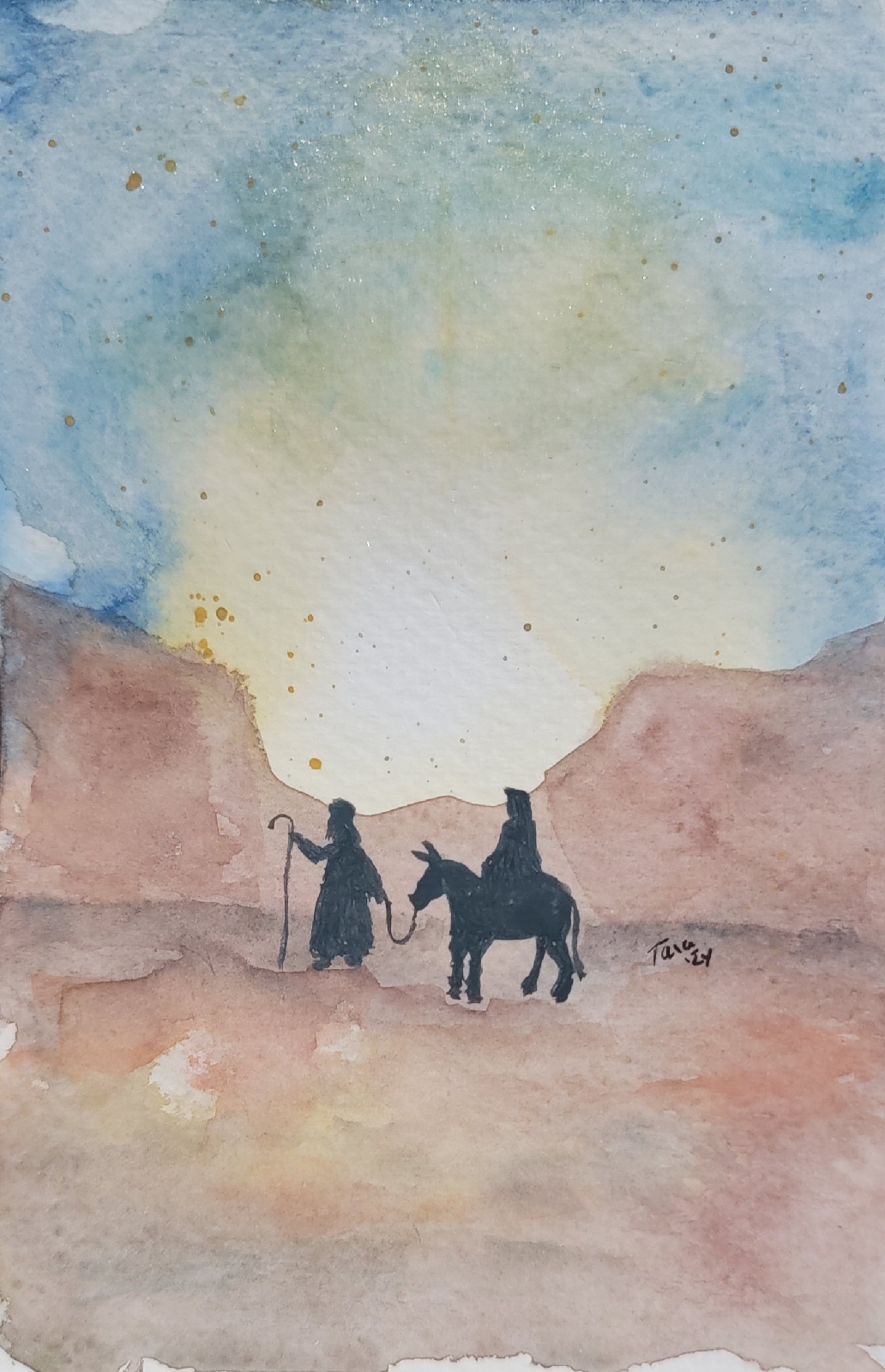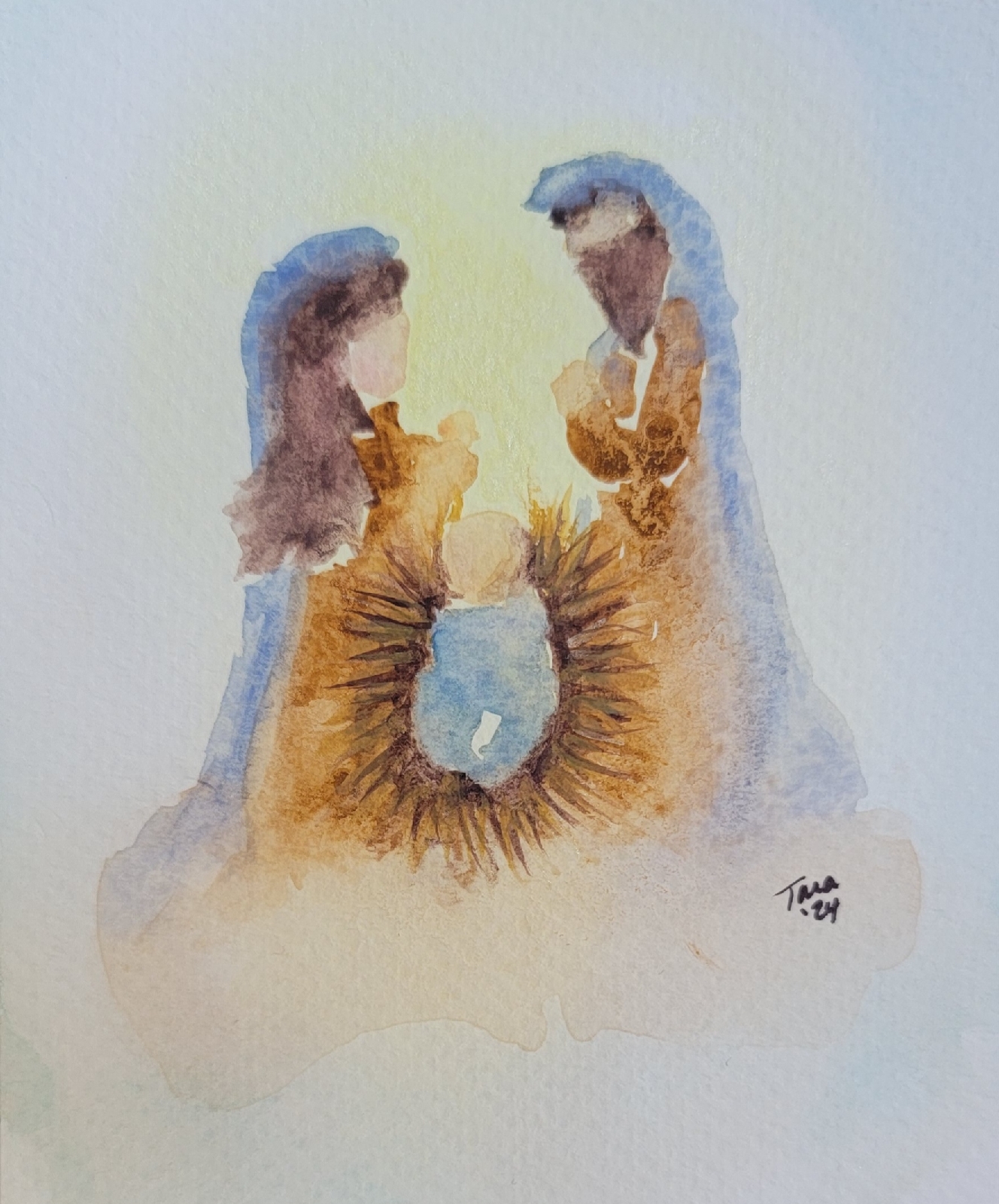Friday, January 9, 2026
A simple process for telling the story of Joseph
Sunday, December 29, 2024
Mary & Joseph's journey depicted in watercolor.
Saturday, December 7, 2024
My Story Reflection as I Welcome the Christmas Season
Tuesday, December 27, 2022
THE BIGGEST STORY BIBLE STORYBOOK by Kevin Deyoung (writer) and Don Clark (illustrator)!
Wednesday, November 30, 2022
Suga's Story Continues
Suga's Story
***This is a fictional account that is based upon a composite of stories taken from a team of storytellers. The names have been changed to protect the storytellers. Every scene is based on a true story that has been told of what is happening on the field.
I heard a car humming in the distance, so I got up from the fire where I was cooking to go see what was causing the noise. A small white van was approaching our village as the dust was kicking up and swirling in a dust storm behind it. When it pulled to a stop several of the village elders walked out to greet the family as they climbed out of the van. It was a husband, wife, and five children. It isn’t typical for us to have someone come to our village because it usually takes two to three hours to reach us from where the city people live.
I paused and watched as the head elder listened to the man speak as he motioned to his wife. The elder motioned for one of the women to come over to him and they introduced the women. The women walked away to our gathering area, so I hurriedly wiped off my hands and rushed over to see what was happening. At first, I stood at the edge of the gathering space in the courtyard waiting and hoping that I might be welcomed to come join them.
The women were seated on a grass mat and the elder’s wife was pouring tea from the pot for the women. It is our custom to offer tea when someone visits. It is very offensive to not accept the tea, but if the tea is accepted this means that the person accepts your hospitality. The visitor reached out and accepted the small cup of tea being offered to her. She cupped it in her hands as she sipped it nodding with pleasure at the soothing comfort it brings to the dry throat.
My friend looked over at me, “Suga, the woman has come to tell us stories. Please help me gather the other women so we can listen together.”
I was so excited! I hurried to get my mother and sisters to come! I said, “Mom, hurry! There is a visitor, and she wants to share some stories with us!” My mom and my sisters looked up with curiosity and got up to follow me. By the time we gathered around in the courtyard there were about four other women already there. The woman stood up front with a beautiful shalwar kameez in bright yellow with silver sequence on it. The sun made it sparkle as she moved around. She was so elegant and a bright contrast to the mud walls behind her.
She said, “Hi, my name is Senda. Thank you for welcoming me so kindly in your village today. I would love to share with you some sacred stories.”
We all sat up a little taller when she said they were sacred stories. We wanted to bring honor to our guest as she told them. In our tradition, it was our custom to gather and listen to sacred stories being told.
Senda said, “This is the sacred story of Jesus, the Son of the Most High God. It is told in the Sacred book called the Bible. In the Bible we are told this true story.
One day an angel spoke to a young maiden named Mary who was engaged to be married to Joseph. They lived in the land of Nazareth near Galilee. The angel said to Mary, “Do not be afraid, favored one of God, the LORD is with you! You will give birth to a son, and you will call him, Jesus. He will be great and will be called the Son of the Most High God. The LORD will give him the throne of his father David and he will reign forever. His kingdom will know no end.
Mary asked, “How can this be? I am still a virgin.”
The angel said, “The Holy Spirit will come upon you and the power of the Most High will overshadow you. The child you will give birth to will be called holy—the Son of God. Even now your cousin Elizabeth in her old age will give birth to a son. She is six months pregnant even though she had been barren. For nothing is impossible with God.”
Mary responded to the angel by saying, “I am the LORD’s servant. Let it be as you have said.”
Then the angel departed from her.
I wondered at the story Senda was sharing with us. I wondered, why was this young maiden was so important? Why was her baby called the Son of God? How can I know more about this Son of God? He sounds so wonderful and powerful. Why have we never heard of this Son of God before? How can I learn more? As these questions were rolling around in my head Senda asked us a question.
“Would you like to hear the story again?” Everyone in the group nodded in agreement. So, Senda told us the true sacred story again. This time I listened with anticipation expecting the angel to tell the young maiden to not be afraid. It was if I was seeing the story unfold in my mind’s eye as she told the story. I was no longer there with our small group, but in the village with the young maiden called Mary as the angel talked to her.
When Senda finished telling the story she said, “May God honor the telling of His sacred story.”
Senda then asked, “What do you learn about God in this passage?”
At first, we all just sat there and looked at her. No one responded. We were not accustomed to someone asking us our thoughts when someone shared. We just listened. So, Senda coaxed us and said, “It is okay. I would love to hear what you think and what you have to say about the story. By answering it will help all of us discover truths together.
She asked again, “What do you learn about God in this passage?
I thought in my mind, “You said the baby was God’s Son!”
One of the women in the group said, “God sent an angel to talk to the young girl.”
Senda responded by saying, “Yes, God sent a messenger to the young girl. That was good. What else?”
Another woman said, “God was the Most High God!”
Senda responded, “Yes! God is the Most High God. There are no other gods like Him. What do you learn about His Son?”
“He would reign forever, and His kingdom will have no end!” my sister cried excitedly from the back of the group.
“You are so right! Very good! So, we have discovered that the Most High God sent His Son to earth to be born as a baby and that as He grows up His kingdom will last forever. What else do we learn about the Most High God?”
I whispered it aloud, “Nothing is impossible for Him.”
It took me by surprise when Senda said, “Yes! That is right! Nothing is impossible for the Most High God!” As she straightened her head covering that was slipping off her head she then asked as she made quiet eye contact with each of us, “What about Mary? What do we learn about Mary?”
One of the women raised her hand to get Senda’s attention and when Senda nodded acknowledgment she said, “Well, she was young and engaged.”
That hit me for a moment. Mary wasn’t married and she was told she would become pregnant with a child. This would bring shame upon her, shame upon her family, and shame upon her village. Why would God ask her to do that? I was too afraid to voice what I was thinking. I didn’t want to shame Senda by questioning her. But, I really wanted to understand.
My thoughts were interrupted by one of the women saying, “She was willing to listen to the angel and ask him questions.”
WOW! I hadn’t caught that either time Senda told the story. Mary questioned God’s angel! We don’t even sit in the same area as the men in our village much less talk to them. We would never consider asking them questions in response. What kind of God allows a woman to ask His angel questions? The more I thought about Senda’s sacred story the more I started to ask questions in my heart about the Most High God. It seems like He honored women, and He was willing to let women talk to His angels. He didn’t shame Mary. He lifted Mary up by blessing her. What kind of God gives women such honor? What kind of God gives women such freedom to speak? How can I know this Most Hight God?
“Yes! Good! These are great answers,” said Senda. “What do you learn about her response to the angel of the Most High God?”
One of the women whispered, “She said she was the Most High God’s servant and agreed that it should be as the angel suggested.”
I thought to myself, “That is what I want, too! I want to be the servant of the Most High God and do as He asks!”
“Yes! That is right! Mary said she was willing to be the LORD’s servant. She was willing to do as the LORD asks. I would like to share with you a little bit about my story and why I am here.”
I leaned in because I wanted to know everything about why Senda came to our village this day!
Saturday, November 19, 2022
Why do I model a simple telling of God's Word?
Monday, October 17, 2022
Lessons Learned as I Messed up Telling Ruth 1
Before we began the story of Ruth, Greg shared background information about where the story fits into God's timeline. He emphasized that Ruth happened during the time of judges when all were doing things in their own way which was contrary to God. He also shared that the Moabite nation was an enemy to Israel and cursed by God.
















